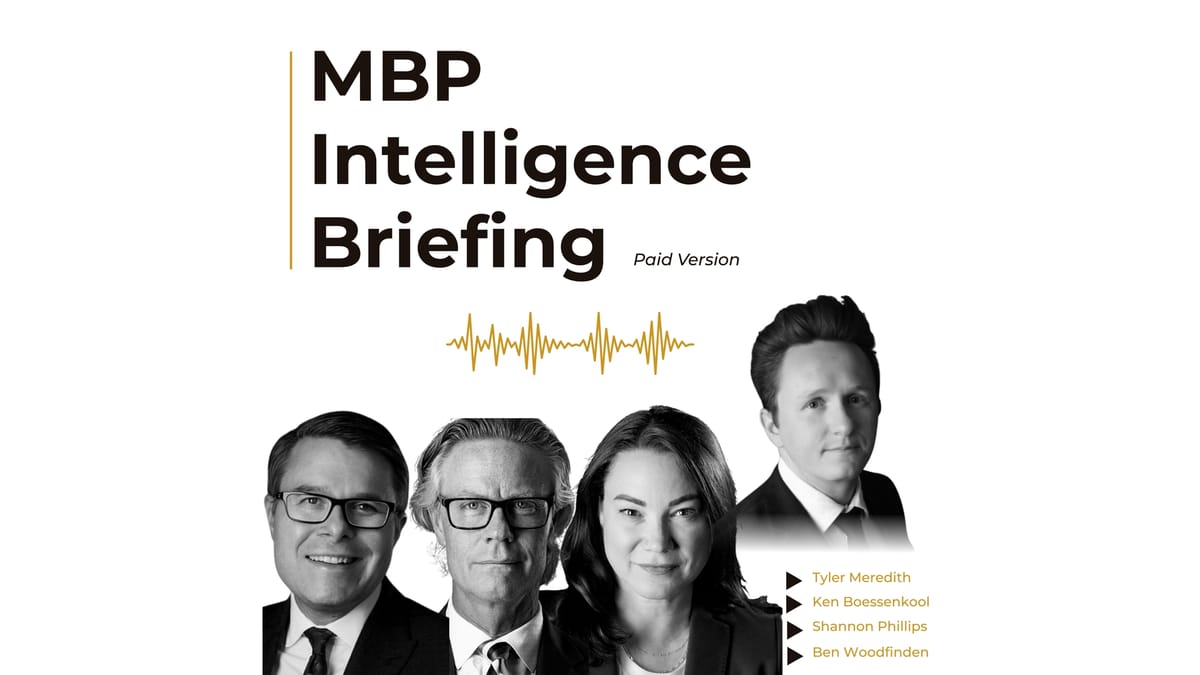Audio Briefings

The Fight for Canada's Auto Sector and Our Industrial Future
Listen on Apple, Spotify and Amazon Music.
Sign up for free:
Get MBP Intelligence directly in your inbox
No spam. Unsubscribe anytime.
In this episode Ben Woodfinden and Shannon Phillips talk with National President of UNIFOR Lana Payne and discuss:
- Stellantis, subsidies and Trump Pressure 03:02:18
- Government Tools and Leverage 05:49:12
- On a Team Canada Strategy, and potential divergence between federal and provincial governments 10:36:15
- On the Future of the Canadian Auto Sector 22:00:01
- On Labour Power and Policy 32:06:10
- Unifor's Position and it’s members 42:20:10
Key Takeaways
On Stellantis, Subsidies and Trump Pressure
- PAYNE: This is the most blatant example of a corporation appeasing Trump. Canada must play hardball, enforce commitments negotiated in 2023, and make companies feel consequences when they move Canadian jobs.
- PAYNE: Failure to act risks a domino effect — if Stellantis escapes accountability, others like GM could follow.
- PHILLIPS: What matters now is not rhetoric but tools — what governments can actually do to make firms fulfill their obligations.
On Government Tools and Leverage
- PAYNE: Canada has powerful levers if it chooses to use them, beginning with a tariff-remission strategy that rewards companies meeting Canadian production commitments and penalizes those that don’t.
- PAYNE: If you’re going to sell here, you need to build here. Market access, energy supply, and public subsidies are all bargaining chips.
- PAYNE: Governments can no longer rely only on incentives. The world has changed — we must use sticks as well as carrots.
On a Team Canada Strategy
- PHILLIPS: The provinces, especially Ontario, have meaningful leverage; their willingness to act matters.
- WOODFINDEN: Emerging divergence between Ford and Carney that was not there a few months ago. Ford is fighting openly while Ottawa appears more cautious.
- PAYNE: Canada risks fragmentation as provinces pursue separate interests. We need a strong Team Canada approach uniting unions, industry, and all levels of government.
- PAYNE: Trump’s trade posture is an existential threat. He’s coming for our auto jobs.
- PAYNE: Need to think about and plan for long-term resilience. We can’t just export raw materials and help someone else build their economy — we must build our own industrial base.
On the Future of the Canadian Auto Sector
- PAYNE: Before Trump’s trade war, Canada was finally rebuilding its footprint — battery plants, EV supply chains, and domestic R&D. U.S. backtracking threatens that progress.
- PAYNE: Warns that China’s massive overproduction of vehicles could soon flood the global market. Canada must plan now to compete.
On Labour Power and Policy
- PAYNE: Section 107 is a very dangerous path. It conditions employers to expect government rescue instead of bargaining fairly. Using 107 will not bring labour peace; it prolongs workplace problems.
- PHILLIPS: Government may need clearer guardrails before invoking 107.
- PAYNE: You don’t get to use 107 — that’s the starting point. Supports mediation and conciliation instead of forced arbitration.
- WOODFINDEN: Notes shifts in the political landscape as unionized and blue-collar voters move toward conservatives.
Shifting Political Coalitions and Realignments
- PAYNE: Unifor stays non-partisan. We build our own power. Every party is chasing the working vote, which strengthens labour’s influence.
- PAYNE: The voter shift is about bread-and-butter issues — housing, wages, inflation — not ideology. People felt heard.
YouTube Video Credits: CBC News, CTV News, Global News, 4K Films By Adnan, Videoscape, Pierre Poilievre, balcony et-al, Luis Vega, Shape Properties, GommeBlog, Exploring Stunning Landscapes From Above, Motion Array
Episode Transcript:
